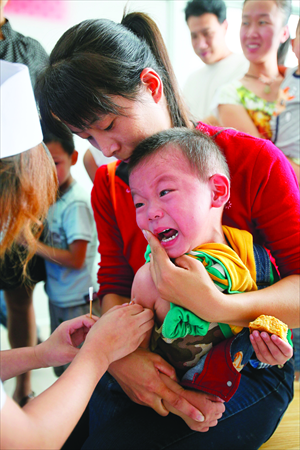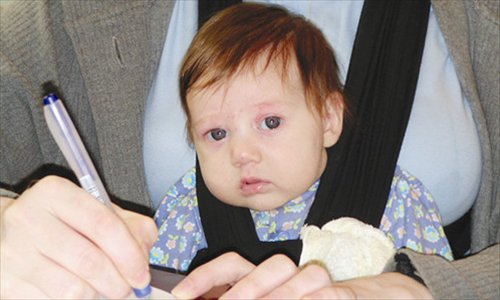HOME >> METRO BEIJING
Injecting concern
By Yin Lu Source:Global Times Published: 2013-7-30 19:08:01

Getting vaccinated can be an uneasy experience for both children and their parents. Photo: CFP

Liora Pearlman's daughter Rachel (inset) suffered from a drooping eyelid and diarrhea two days after receiving her vaccinations. Photo:Courtesy of Liora Pearlman
In 2004, Liora Pearlman was alarmed to discover her 2-month-old daughter Rachel with a drooping right eyelid and suffering diarrhea after receiving her diphtheria-pertussis-tetanus (DPT) and oral polio vaccines (OPV). Both shots were given as standard vaccinations for babies born in China.
Pearlman took Rachel to the hospital, where doctors assured her everything was fine. She had a healthy baby and was just being a nervous new mother, they told her.
Reluctantly, Pearlman returned home and put her daughter back in her crib. The next time she saw Rachel, she was choking on her own vomit.
Pearlman decided not to trust the doctors anymore, but was still puzzled by the mysterious symptoms. Over the next few months, she researched Rachel's side effects, including puffiness and fatigue, and found out that the vaccines might be to blame.
"No doctor ever admitted that [the symptoms] were caused by the vaccines or tied it together for me," said Pearlman, an American who has lived in Beijing for more than a decade. "The symptoms first appeared the day after the vaccines. The connection was undeniable, the change both immediate and long-lasting."
Whenever Pearlman notices children with lazy eyes, poor coordination or short attention spans, she cannot help but speculate whether diet, environmental factors or vaccines are responsible.
"Isolated cases [of abnormalities in children] happen all the time, but very rarely do parents band together to speak out," Pearlman said.
Rachel's experience was enough to convince Pearlman against giving her subsequent children - a son and daughter, also born in China, now aged seven and four respectively - any vaccinations at all.
"I could not choose theoretical harm over actual harm. I'll take my chances," said Pearlman. "I would much rather they have the flu and be done with it."
Choosing the right immunizations
Vaccinating children against potentially life-threatening diseases is a no-brainer for most parents. For babies born in China, getting jabbed is also a necessary step before enrolling at school.
According to vaccination procedures issued in 2009 by the Beijing Health Bureau, there are two vaccine packages available locally: Type I, which includes 16 vaccines and is subsidized by the government; and Type II, which includes nine vaccines and costs at least 5,000 yuan ($815) at the parents' expense.
Under Type I, the average child will receive more than 20 vaccinations before the age of four.
Colin Friedman's 18-month-old son, Aviv, is no stranger to needles. He has received every vaccine recommended by doctors except one for the Japanese encephalitis virus (JEV), which Friedman decided is not a risk in Beijing.
Friedman, who is from the UK, is not concerned about vaccines, some of which are made locally, causing more harm than good. Aviv hasn't had an adverse reaction to any of his injections administered at Beijing United Family Hospital, he said.
His trust is also rooted in what he calls "economic logic," explaining that a private hospital is unlikely to risk its reputation by compromising on the quality of its immunizations.
Yvonne Tang, a 27-year-old stay-at-home mother living in Sydney, Australia, took her 4-month-old son to hospital last week to receive his second shot of a multi-vaccine that immunizes him against hepatitis B, tetanus, polio and other viruses. Much like the first time, her son had a slight fever (under 38.5 C) and mood swings after the shot.
Tang is determined for her son to follow the Australian immunization schedule, yet eager for him to have shots that will protect him in China, such as the Bacillus Calmette-Guérin (BCG) vaccine not given in Australia, where they plan to return in a few years' time.
Questionable quality
Distrust in Chinese vaccines among parents has flared following high-profile scandals over the past decade. According to media reports, in May 2011, a 7-month-old boy in Zhejiang Province died after receiving the BCG vaccine. A year earlier, a 4-year-old girl from Jiangsu Province became overweight and suffered arthritis after receiving a hepatitis A vaccine. And in 1995, a teenager from Anhui Province was diagnosed with polio after taking a polio vaccination pill.
After days of research, new mother Xiao Jiu decided to take her 3-month-old daughter to receive an imported polio vaccine. Despite its higher cost compared to an oral domestic variant, Xiao insists nothing is more valuable than peace of mind.
"I chose the imported vaccine because I saw many reports about the [Chinese] OPV causing disabilities," said Xiao, who opted for four imported shots rather than 12 homemade ones. "Having eight fewer shots minimized the possibility of eight adverse reactions."
China vaccinates more children than any other country in the world, with an estimated 1 billion vaccinations annually, according to a report released by the Chinese Center for Disease Control and Prevention (CDC).
But the technology, quality and cold-chain transportation of vaccines in China have drawn criticism from health groups for failing to meet international standards. In China, 46 vaccines against 27 diseases are produced by about 40 drug makers, the Southern Metropolis Daily reported on June 23. Wang Yu, an official with CDC, claimed that China's vaccine development hasn't changed in 30 years, the report said.
The Conspiracy of Genetically Modified Food and Vaccines, a 2011 book by Chai Weidong, accused pharmaceutical giants of neglecting vaccine safety to pursue profits, citing cases of polio caused by polio vaccines as infamous examples.
Options for expat parents
In Beijing, if both parents are foreigners they are entitled to get their children vaccinated for free at designated public hospitals, said Ma Yanming, publicity officer for the Beijing Health Bureau.
Zhang Yonghui, head nurse at Amcare Women's & Children's Hospital, said many expat parents are torn between choosing a domestic or foreign vaccination package.
"If a child stays in Beijing for more than three months, we usually suggest parents follow local vaccination procedures," said Zhang. "For some vaccines, only domestic ones are available."
Immunizations required for China include the measles-rubella (MR) vaccine, given when an infant is 6 months old, the measles-mumps-rubella (MMR) vaccine, given at 18 months, as well as the BCG and JEV vaccines.
Giving 'informed consent'
Zhang, who hasn't seen a child suffer any serious reaction to a vaccine in her seven years on the job, acknowledged that fevers, swelling and stiffness are common, harmless side effects. "Nevertheless, observation for 15 to 30 minutes after a shot at the hospital is very important," she said.
Zhang also warns parents to value vaccination certificates "as you would your credit card." Medical staff are required to inform parents about possible consequences and ensure they sign a form outlining their informed consent, she added.
Pearlman recalls giving no such "informed" consent to her doctor ahead of Rachel's vaccinations.
"Doctors might use scare tactics and try to talk mothers out of following their instincts, but it's the mother who has to live with her decision for the rest of their life," she said.
Posted in: Metro Beijing